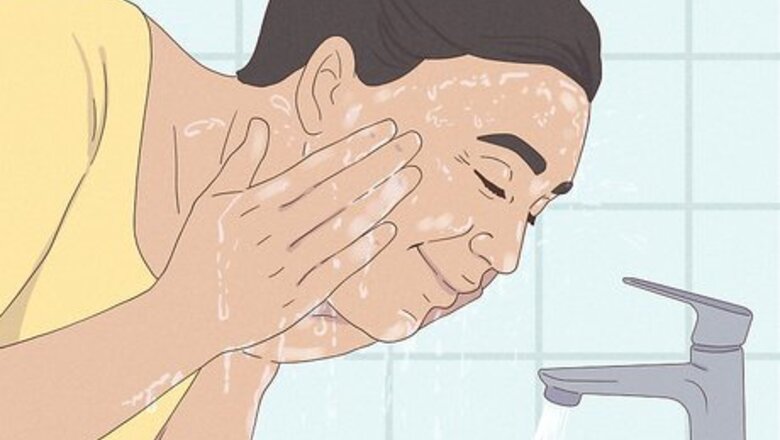
views
Creating a Fresh Face with Foundation
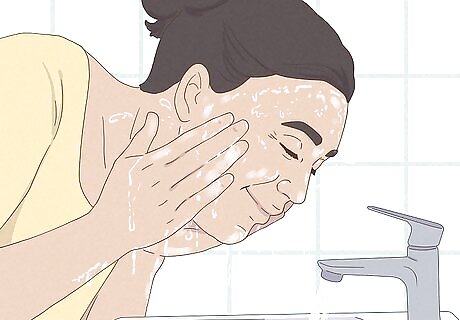
Wash your face with a gentle cleanser. Before applying makeup, gently clean your face with a mild facial cleanser and lukewarm water to wash away dirt, oils, and other contaminants that could irritate your skin and cause inflammation. Massage the cleanser into your skin with your fingertips, since using a cloth or sponge could irritate your skin. Rinse away all the cleanser and pat your face dry with a clean towel.Tip: If your face tends to have rough or flaky patches of skin, use salicylic or glycolic acid cleanser 3 times a week in place of your regular cleanser. This will help gently exfoliate your skin and give it a more youthful appearance. Avoid cleansers that contain harsh, drying ingredients such as perfumes, alcohol, or parabens. Since your skin tends to dry out with age, opt for a moisturizing cleanser that contains ingredients like shea butter or glycerin. This will help hydrate your skin and minimize fine lines, wrinkles, and dry patches.
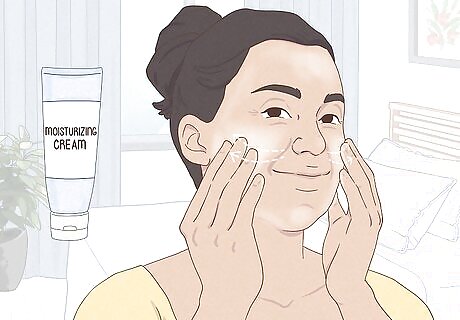
Smooth on a moisturizer using light, sweeping motions. Washing your face can dry it out, which will age your skin and cause makeup to go on unevenly. After you wash your face, smooth a moisturizer or hydrating serum over your skin, working from the center of your face and blending up and out. Use light, sweeping motions with your fingertips to improve circulation and help your skin absorb the moisturizer. Don’t forget your neck and jawline! When applying moisturizers to this area, start at the base of your neck and move up toward your jaw, then work from the center of your chin to your ears. Choose a moisturizer that contains retinoids or hyaluronic acid to fight wrinkles and firm your skin. A moisturizer with UV protection can also help prevent sun damage and premature aging.
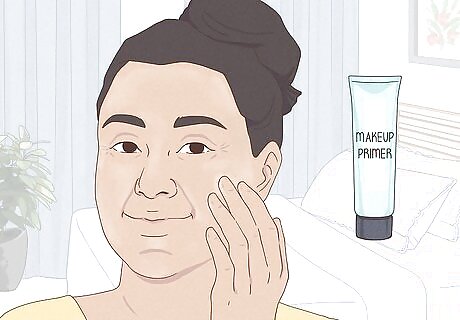
Apply a primer to even out imperfections. Primer creates a smooth canvas for your makeup and helps minimize the appearance of wrinkles, redness, and inflammation. Smooth the primer on with your fingertips, starting from the center of your face and working outward. Look for a primer that moisturizes your face to help your skin look dewy and youthful. Some primers are specifically formulated for mature skin. These tend to contain moisturizers and wrinkle-minimizing ingredients, such as hyaluronic acid.
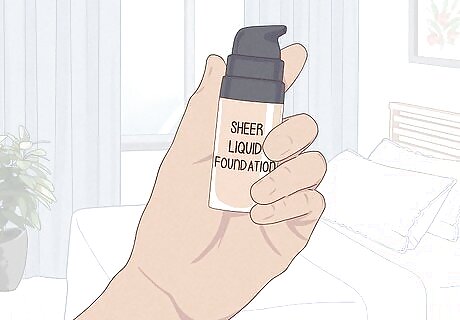
Choose a sheer, buildable foundation to avoid caking. You may be tempted to slather on a thick foundation in an effort to hide wrinkles and blemishes, but a heavy foundation can actually cake in fine lines and make them more prominent. Instead, choose a sheer foundation with buildable coverage to perfect your skin without making it look overdone. A light BB or CC cream can help smooth over imperfections and give your skin a slight sheen. Don’t be afraid of having a little shine to your skin—it will help give you a more youthful appearance!
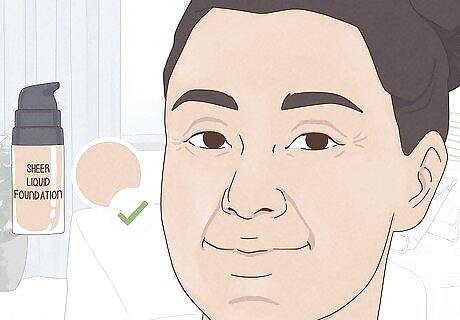
Pick a foundation that matches your natural skin color. Get a foundation with a rich pigment that’s close to your natural color to create a healthy glow. Avoid choosing a foundation that’s too light, which can give you a washed-out appearance and make you look older. On the other hand, a foundation that’s much darker than your natural skin tone will look garish and unnatural. If possible, test a little of the foundation on your neck, jawline, and the center of your face to make sure it’s a good match.
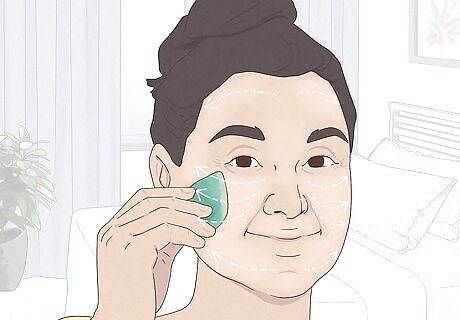
Blend your foundation out from the center of your face. Use your finger to dab a little bit of foundation on your forehead, nose, cheeks, and chin. Then, use a damp applicator sponge or a foundation brush to gently dab the foundation and blend it outward and upward. Take care not to drag or rub the foundation, since this can irritate your skin. Be especially careful of the delicate skin under your eyes.
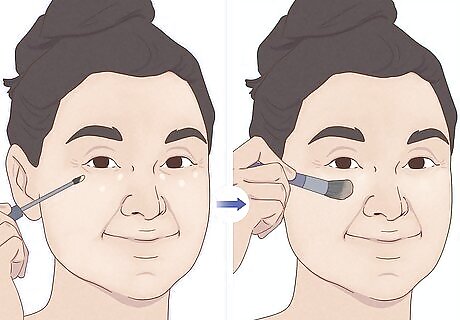
Swipe concealer on any problem spots and tap it in to blend. Use a concealer wand or brush to swipe a little concealer on the areas under your eyes (especially the recess at the corner of your eye, next to your nose) and around your nostrils. Dab some full-coverage concealer over any brown spots or blemishes. Use a brush or your finger to tap the concealer into your skin. For the shadowy areas under your eyes, use a concealer that’s a little lighter than your natural skin tone. Squint your eyes slightly when tapping in under-eye concealer. This can help you get into the crease under your eye more precisely.
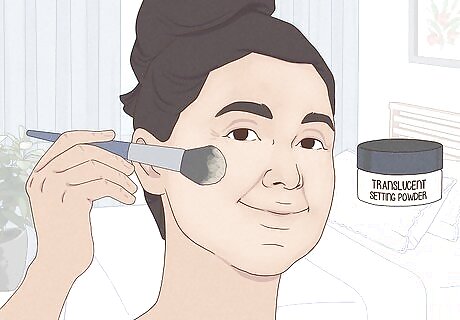
Brush on a light layer of powder. Use a soft powder brush to swirl on a thin layer of sheer setting powder. Focus on areas like your nose, cheeks, and the middle of your forehead, especially if they tend to get a little oily. Take care not to overdo the powder, since it can make your face look dull or settle in fine lines and make you appear older. Remove excess powder by tapping the brush on the lid of the powder pot or on your arm before you apply it to your face.
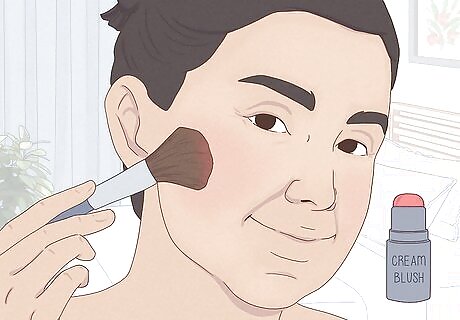
Smooth a little cream blush over the apples of your cheeks. Cream blush goes on smooth and helps give your skin a youthful glow. Use your fingers or an applicator sponge or brush to dab a little blush high on the apple of each cheek (the part that sticks out when you smile). Keep tapping the blush to gently blend it into your skin. Avoid sweeping the blush along the underside of your cheekbones, since this can make your cheeks look sunken and gaunt.
Doing Your Eyes and Brows
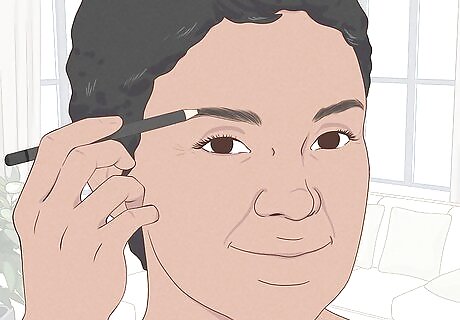
Fill in your brows with a subtle brow pencil. Having well-defined, natural-looking brows will help you look youthful and draw attention to your eyes. Choose a brow pencil that’s close to the natural color of your eyebrows and fill them in using light, hair-like strokes. Start directly above the outer corner of your nose and finish slightly beyond the outer corner of your eye. If your brows are going grey, consider getting them tinted at your local hair salon.
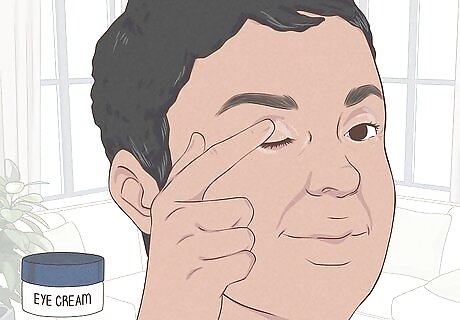
Moisturize your lids and under-eyes with an eye cream. The skin around your eyes is one of the first areas to start showing signs of age. Putting makeup on dry skin can make bags and wrinkles stand out even more. Give your eyes a boost by dabbing on a moisturizing eye serum or cream, focusing especially on the delicate under-eye area. To avoid pulling on the delicate skin around your eyes, tap the moisturizer to blend it rather than rubbing it. Help lift and massage the skin under your eyes by moving from the inner corner of your eye outward, following the natural curve of your eye.
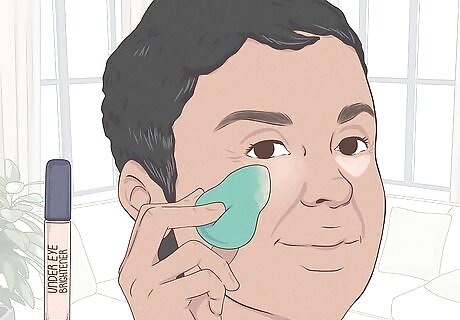
Brighten your under-eye area with a highlighter or light shadow. Use an under-eye highlighter to dab a bright, inverted triangle shape under each eye. Tap gently with your fingers or a small brush or sponge to blend it in. This will help conceal dark circles and give you a more alert and youthful look. You can use an under-eye brightener, concealer, or a light eyeshadow to brighten your under-eye area. Stick to cream or liquid formulas to avoid drying out the delicate skin under your eyes.
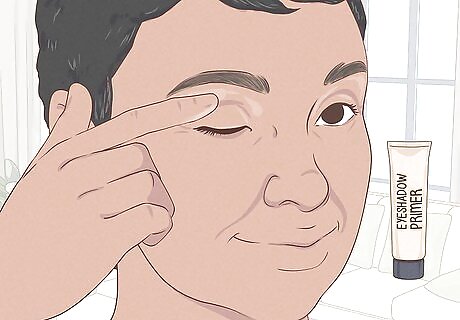
Add a primer to your upper lids to even them out. Sweep a little primer onto your lids to give your eyes a dewy glow and even out imperfections. This will also keep your eyeshadow from pooling in the fine lines and creases on your eyelids.Tip: Stick to a primer that’s formulated for the eyelids rather than your regular face primer. Face primers are less effective for this purpose and could irritate your eyes.
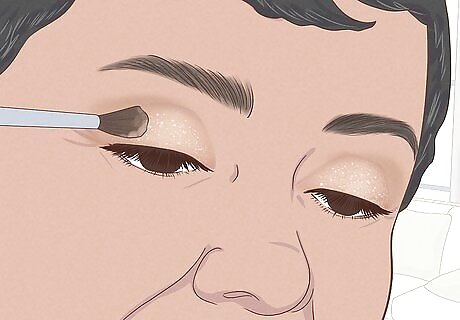
Choose a shimmery cream shadow to add a dimensional glow. Powdered and matte shadows can make the skin around your eyes look dull and flat. Select a cream shadow with a little shimmer instead for a bright and dewy look. Cream shadows are also less likely than powder shadows to settle in the creases on your eyelids. Avoid shadows that are glittery, which can look harsh on mature eyes. Stick to shadows with a subtle shimmer or satin finish.
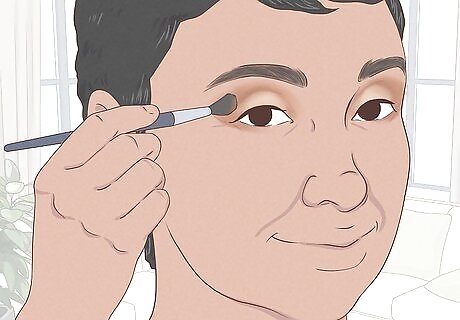
Use a medium shadow on your lids and blend it up above the crease. You can make your eyelids look bigger and less hooded or droopy by applying a medium shade over your whole eyelid. Use a shadow brush to blend the shadow up from your lash line to the area slightly above your natural eyelid crease. Blend out the edges of the shadow to make it look soft and natural. Avoid shades with yellow or red undertones, since these can make your eyes look red and tired. Instead, opt for cool or jewel-toned shadows.
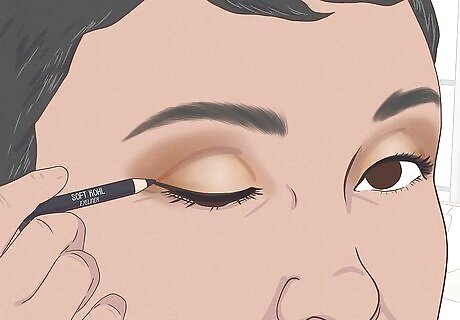
Smudge on a soft kohl eyeliner. To give your lash line a lush, healthy appearance, use a soft kohl eyeliner pencil along your upper lash line and gently smudge it with a liner brush. You can add even more definition by carefully applying the liner in between each lash. If black eyeliner looks too harsh, try using a softer shade, like brown, plum, or navy. Avoid using sharp, graphic eyeliners, which tend to look droopy and uneven on mature skin. Some makeup artists recommend using liquid eyeliners instead of pencils to avoid tugging the delicate skin on your eyelids. Choose a blendable formula to avoid overly harsh lines. You can also make your eyes look bigger and brighter by putting white eyeliner on the waterline of your lower eyelid.
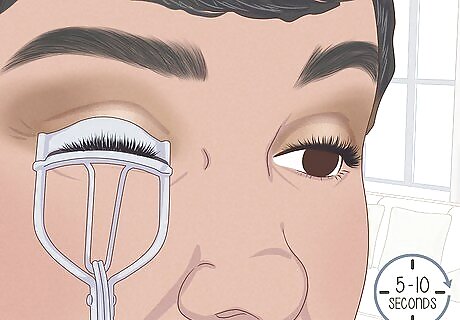
Curl your lashes to make your eyes look wider and brighter. Before you put on mascara, use an eyelash curler. Position the curler at the base of your lashes and give it a few gentle squeezes, then hold it in place for 5-10 seconds. Repeat at the middle and ends of your lashes. This will help make your lashes look fuller and give your eyes an instant lift. Invest in a good quality curler with silicone pads to avoid pinching your eyelids or crimping your lashes.
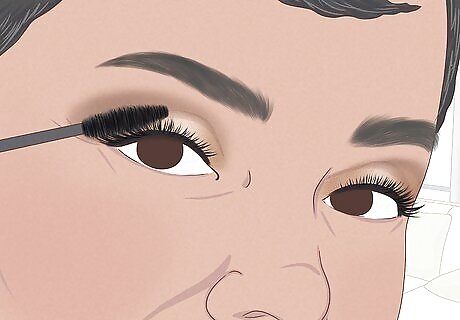
Sweep on some mascara to volumize your lashes. Putting on mascara will make your eyes look bigger and more youthful. Choose a volumizing mascara that’s slightly darker than your natural eyelashes and sweep it along the undersides of your top lashes, moving from base to tip. If you like, you can also put a little mascara on the roots of your lower lashes. If your natural hair color is brown or black, go for a black mascara. Use brown if your natural color is blond or red.
Putting Lipstick on Mature Lips
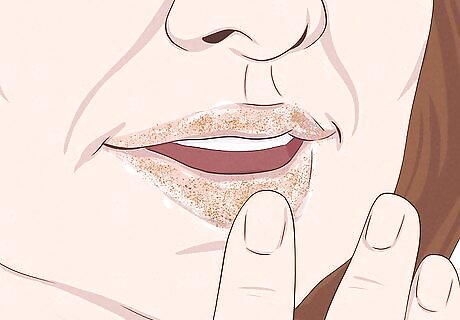
Exfoliate your lips to remove dry skin. If your lips are dry and flaky, lipstick can settle in the cracks and around dead skin. Gently buff your lips with a lip exfoliator, such as a sugar scrub, to smooth them out. Make sure to buff around the outer edges of your lips, too. Rinse the exfoliator away with lukewarm water when you’re done.
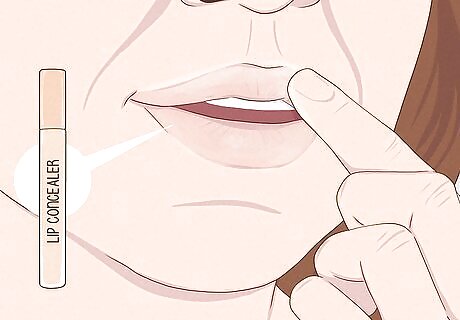
Cover your lips with a concealer that matches your skin tone. Applying a concealer can help even out your lips and prevent your lipstick from smudging or bleeding. Choose a concealer that’s the same color as your natural skin tone and blend it into your lips and the surrounding skin with a foundation brush. You can also use a tinted lip primer to ensure a perfect finish and help your lipstick last longer.
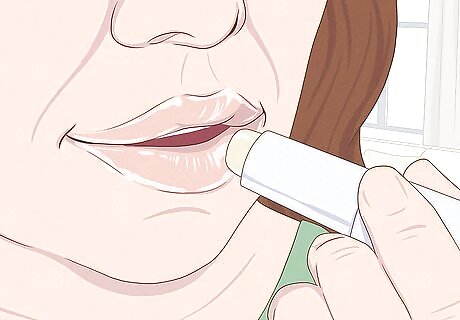
Apply a balm to hydrate and smooth your lips. Smooth a little moisturizing balm over your lips to help hydrate and protect them. This will help minimize the appearance of fine lines and keep your lips from drying out further once you put on your lipstick.Tip: Choose a lip balm with SPF to protect your lips from sun damage, which can prematurely age your skin.
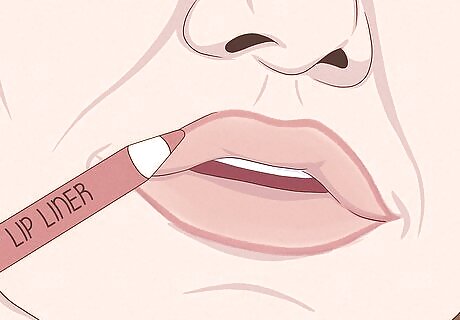
Define your lips with a natural-looking liner. Apply a liner in a shade close to your natural lips or your lipstick. This will help your lips look fuller and more clearly defined. For even fuller-looking lips, extend the liner slightly beyond the natural borders of your lips where they peak at the top, and also at the middle of your lower lip. Don’t go outside the border around the rest of your lips, or they’ll look unnatural and overdone.
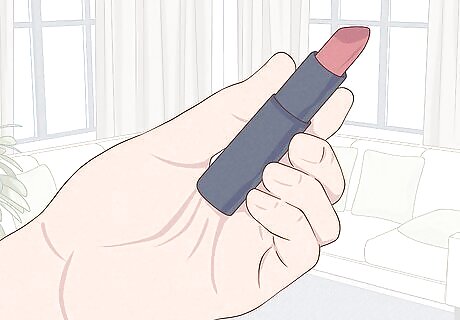
Choose a hydrating lipstick to avoid drying. Select a moisturizing formula rather than a matte lip color or an extended-wear shade that will dry out your lips. Moisturizing lipstick will go on more evenly and make your lips look fuller and more youthful. Sheer, buildable lipsticks can give your lips a healthy, natural-looking sheen along with a wash of color. They also tend to be less drying than matte lipsticks. Avoid long-lasting matte liquid formulas, which can be extremely harsh and drying on your lips.
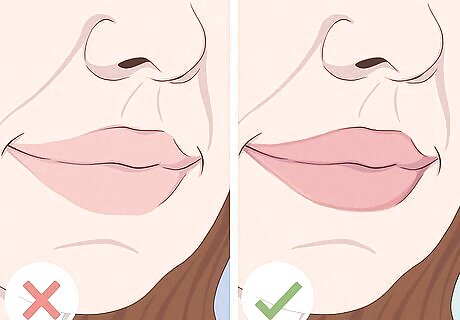
Avoid pale shades that wash out your lips. Lipsticks that are too pale will blur your lip line and make your lips appear older. A pale lip can also make you look ill or tired. Opt for lipsticks that are at least as dark as the darkest part of your lip. Don’t be afraid to go for a bold lip color! Bright reds, deep berries, and lush pinks and corals can all look fabulous on mature women.
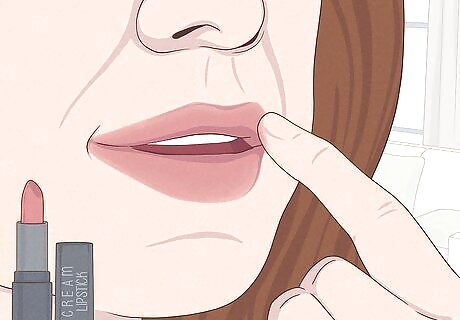
Put on the lipstick with your finger or a lip brush. Applying your lipstick directly from the bullet makes it harder to achieve a precise, well-defined finish. Use a small brush or your finger to carefully apply the lipstick within the borders of your lip liner. To make your lipstick last longer, build it up with a brush and then use a tissue to blot your lips. If you like, add 1-2 more coats, focusing on the center of your lips.


















Comments
0 comment